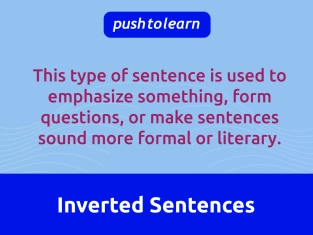by PushtoLearn
Negative Inversion
Table of Contents
Negative Inversion Exercises
These exercises focus on Negative Inversion
What Is Negative Inversion?
Negative inversion happens when a sentence begins with a negative adverbial (e.g., never, seldom, hardly) and the subject-verb order is reversed.
✅ Normal sentence:
-
I have never been so tired.
✅ With inversion: -
Never have I been so tired.
This structure makes the sentence more dramatic, formal, or persuasive.

How to Use Negative Inversion
Never, Rarely, Seldom
These adverbs mean “not often” or “almost never.” They are used with present perfect, past perfect, or modal verbs (can, could, etc.).
|
Normal Sentence |
Sentence with Inversion |
|
I have never seen such a big cake. |
Never have I seen such a big cake. |
|
She seldom visits her hometown. |
Seldom does she visit her hometown. |
|
They can rarely afford to travel. |
Rarely can they afford to travel. |
Hardly, Barely, Scarcely, No Sooner
These words describe an event that happened immediately before another event. They are often used with the past perfect tense.
|
Normal Sentence |
Sentence with Inversion |
|
We had hardly started eating when the phone rang. |
Hardly had we started eating when the phone rang. |
|
She had no sooner left than it started raining. |
No sooner had she left than it started raining. |
|
He had barely spoken when the teacher interrupted him. |
Barely had he spoken when the teacher interrupted him. |
🔹 Note:
-
Hardly, barely, scarcely are followed by when.
-
No sooner is followed by than.
Only + Time Expressions
Expressions like only after, only when, only later require inversion.
|
Normal Sentence |
Sentence with Inversion |
|
I realised the mistake only after I submitted the form. |
Only after I submitted the form did I realise the mistake. |
|
They discovered the truth only later. |
Only later did they discover the truth. |
Phrases with "No" and "Not"
Phrases like under no circumstances, in no way, on no account require inversion.
|
Normal Sentence |
Sentence with Inversion |
|
You should not enter under any circumstances. |
Under no circumstances should you enter. |
|
We did not agree to this in any way. |
In no way did we agree to this. |
"Little" for Restriction
"Little" in negative inversion shows that someone was unaware of something.
|
Normal Sentence |
Sentence with Inversion |
|
She did not know she would become famous. |
Little did she know she would become famous. |
|
People do not realise how hard it is. |
Little do people realise how hard it is. |
Common Mistakes in Negative Inversion
❌ Wrong: Never I have seen such a thing.
✅ Correct: Never have I seen such a thing.
❌ Wrong: Hardly I had finished my homework when my mom called.
✅ Correct: Hardly had I finished my homework when my mom called.
❌ Wrong: Only after he left, I understood.
✅ Correct: Only after he left did I understand.
Everyday Use of Negative Inversion
While negative inversion is mostly formal, it can be used in everyday speech for storytelling and emphasis.
✅ Casual conversation:
-
“Never have I seen such a beautiful sunset!”
-
“Little did she know that her life was about to change.”
✅ Formal speech/writing:
-
“Under no circumstances should this policy be ignored.”
-
“No sooner had he arrived than the meeting began.”
You may also find it useful looking at the lessons about Cleft Sentences and Fronting.
FAQs About Negative Inversion
What is negative inversion in English?
Negative inversion happens when a sentence starts with a negative adverbial (e.g., never, hardly, not only), and the subject-verb order is reversed.
Why do we use negative inversion?
It is used for emphasis, making speech and writing sound more dramatic, formal, or persuasive.
What are the most common negative adverbials that require inversion?
Common ones include:
-
Never, rarely, seldom
-
Hardly, barely, scarcely, no sooner
-
Only if/when/after, only later
-
Under no circumstances, in no way, not until
Can negative inversion be used in casual speech?
Yes, but it is more common in formal writing, literature, and storytelling.
What is the difference between normal word order and negative inversion?
-
Normal: I have never been so scared.
-
Inverted: Never have I been so scared.

